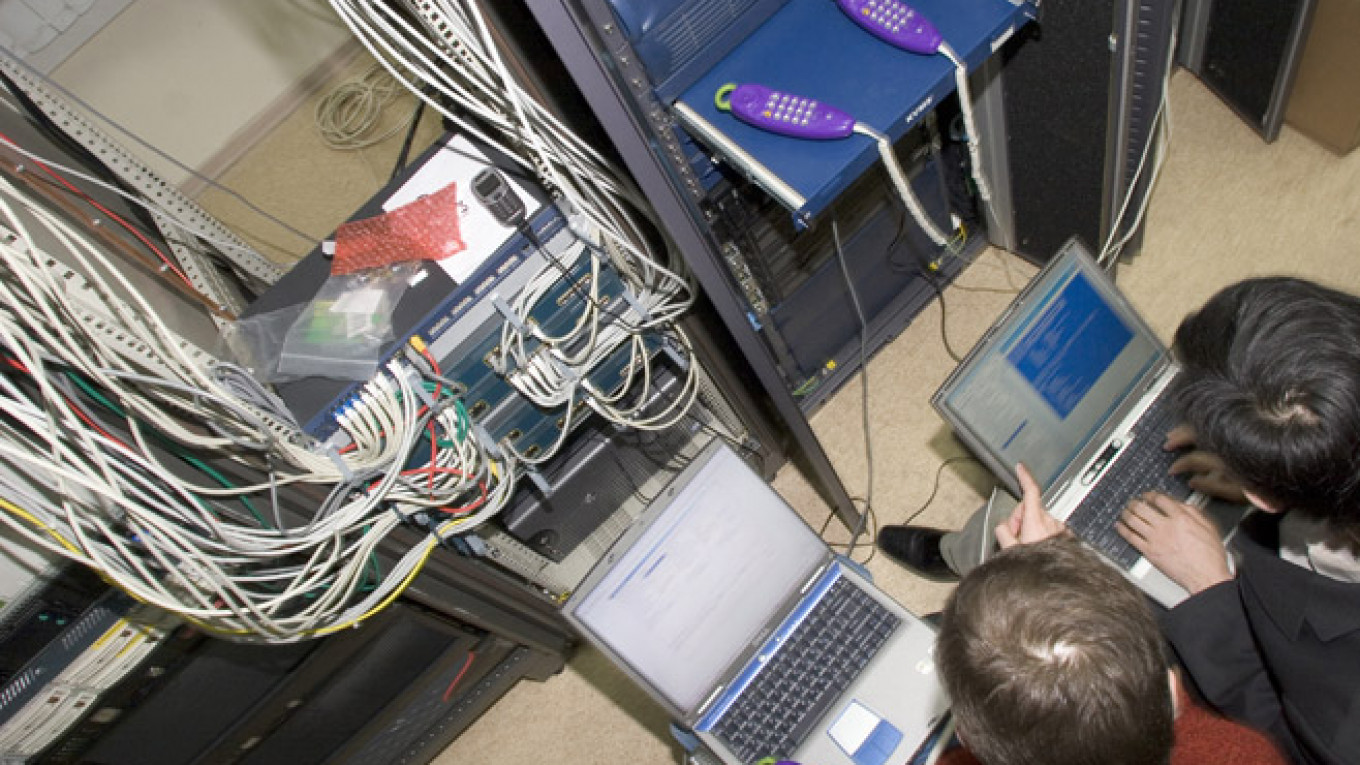Foreign software has become the latest target of Russian officials' clamorous calls for self-sufficiency, with plans to swiftly replace all foreign imports and triple the number of Russian programmers heralding a crusade that analysts consider misguided and hopelessly optimistic.
"We stand for complete sovereignty of information," Communications and Mass Media Minister Nikolai Nikiforov said late last week, going on to trumpet state plans to foster an "entire industry of import-replacing software."
This ambitious task can be accomplished within three years for most products and "five to seven in certain areas," Nikiforov said. During that time, the state will have to increase the number of programmers from 350,000 to 1 million, he added.
Russia has seen a wave of similar initiatives this year, with officials calling on domestic industry to phase out foreign financial, defense and agricultural products as Russia faces off with the West in a war of sanctions and import bans over the crisis in Ukraine.
But along with the other plans, the state drive to replace foreign software will eventually come crashing against the harsh wall of reality, IT experts said.
"The only people who are not laughing are those who are trying to benefit from the government contracts," said Anton Nossik, a prominent blogger and pioneer of the Russian Internet.
In the first place, the world of software is dominated by giants: U.S. software producer Microsoft raked in nearly $74 billion last year, followed by Oracle and SAP with $37 billion and $20 billion, according to Fortune magazine.
These companies have sunk billions of dollars and millions of man hours into perfecting their products, giving them an advantage that the Russian IT industry, which is severely stymied by a lack of qualified specialists, will be hard pushed to overcome.
As for the state's timeline, it is "obviously not realistic," said Karen Kazaryan, chief analyst for the Russian Association of Electronic Communications.
Creating an operating system that could actually replace Windows, for instance, would take at least 10 years of concentrated work and investment, he said.
Ultimately, the plans do more harm than good for the industry, Nossik said. "There is no industry that ever benefited from unrealistic planning."
Public Project
If the government is fully committed to producing Russian equivalents to foreign products, it will have to turn to state corporations or coerce software companies into taking on the projects, experts said.
Russian programmers and entrepreneurs do not share the state's enthusiasm for replacing foreign imports with Russian software, Kazaryan said.
"They're interested in creating new projects and competing on a global level, as many Russian companies do successfully," he said.
As a result, government companies would have to be put on the case, but these corporations have a less-than-stellar track record with large-scale IT projects.
State telecommunications giant Rostelecom earlier this year rolled out its own search engine, Sputnik, touted as the Russian government's answer to Google and intended to become one of the Runet's top 10 sites within four years.
But after a brief flurry of interest following its release in May, Sputnik now draws an average of just 3,000 users a day, according to web statistics site LiveInternet.ru.
As the country's biggest consumer of system integration, the state has the bargaining power to persuade some Russian software producers to take on import substitution projects should it want to, Nossik said.
"But in the end, [import replacement] is bound to be like Sputnik, only with billions of rubles," he said.
Talent Crisis
Underlying the problem is an even more basic issue: Russia does not have enough programmers as it is, let alone enough to re-create all leading world software products.
The lack of qualified specialists is "the main impediment" to the development of Russia's IT industry, according to Nikolai Komlev, executive director of the Association of Computer and Information Technologies.
A demographic slump compounded by insufficient IT education has left the industry struggling to find talent, while poor conditions for small business tend to send ambitious entrepreneurs with startup ideas abroad.
As it stands, most experts on the IT labor market expect that an influx of programmers from other countries will be needed to meet the industry's needs.
As for the state's plans to nearly triple the number of Russian programmers, such a "generational change" would eat up at least 10 years, said Alexander Shakhov, head of hiring in the IT/telecom group of recruiting agency Unity.
During that time, businesses and the government would have to invest extensively in educational programs and improve the image of IT professions to achieve the intended effect, he said.
See also:
Wary of the West, Russia and China Expand Trade in Computer Software
Contact the author at [email protected]
A Message from The Moscow Times:
Dear readers,
We are facing unprecedented challenges. Russia's Prosecutor General's Office has designated The Moscow Times as an "undesirable" organization, criminalizing our work and putting our staff at risk of prosecution. This follows our earlier unjust labeling as a "foreign agent."
These actions are direct attempts to silence independent journalism in Russia. The authorities claim our work "discredits the decisions of the Russian leadership." We see things differently: we strive to provide accurate, unbiased reporting on Russia.
We, the journalists of The Moscow Times, refuse to be silenced. But to continue our work, we need your help.
Your support, no matter how small, makes a world of difference. If you can, please support us monthly starting from just $2. It's quick to set up, and every contribution makes a significant impact.
By supporting The Moscow Times, you're defending open, independent journalism in the face of repression. Thank you for standing with us.
Remind me later.






